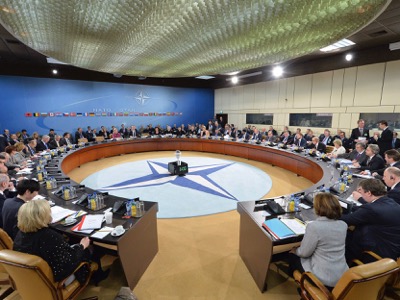“THE ART OF WAR”
Europe’s doves in arms
No stone must be left unturned. So characterizes the efforts of the European leaders to increase Nato’s presence in Eastern Europe and extend its capabilities to intervene in the South. This will enable them to kill two birds with one stone: they will be well resourced to deal with the possibility of Washington and Moscow developing closer ties and also can take what they can before increasing their contribution to the Alliance.
The Nato Ministers of Defense met in Brussels at the North Atlantic Council and resolved further measures to “strengthen the Alliance”. These measures focused on the Eastern Front in particular, with the deployment of new “deterrent forces” in Estonia, Latvia and Poland, assembled for increasing Nato presence across the whole of Eastern Europe with drills both on land and at sea. In June, four multinational battalions will be fully operational so that they can be deployed in the region.
At the same time, Nato will increase its naval presence in the Black Sea. Furthermore, Nato has launched the creation of a multinational command of special forces, formed initially by Belgian, Danish and Dutch forces. Finally, the North Atlantic Council praises Georgia for the progress it has made on the journey that will enable it to enter the Alliance, becoming the third Nato country (together with Estonia and Latvia) positioned directly at the Russian border.
On the southern border, closely connected to the Eastern border (notably through the Russia – Nato confrontation in Syria), the North Atlantic Council announces a series of measures to “contain threats coming from the Middle East and North Africa and to project stability beyond our borders”.
At the Command of Joint Allied Forces at Naples, the Hub for the South is established, with a personnel of about 100 soldiers. Its mission? To “evaluate threats coming from the region and to tackle them together with nations and partner organizations”. It will provide Awacs spy planes and drones and will soon become operational at Sigonella.
For military operations that are already underway, [there is] the Nato “Response Force” of 40,000 men, in particular, its “Spearhead force of very high operational readiness”.
The Hub for the South — explains Stoltenberg, the Secretary-General — will increase Nato’s capacity to “anticipate and prevent crises”. In other words, once a crisis has been “anticipated” in the Middle East, North Africa or anywhere else for that matter, Nato will be able to carry out a pre-emptive military strike. In this way, the entire Atlantic Alliance adopts Bush the “Hawk’s” doctrine on “pre-emptive” wars.
At present, the first wishing to strengthen Nato, especially with regard to its anti-Russian role [are] the European governments of the Alliance: those that, generally speaking, present themselves as “doves”. Indeed, they fear being bypassed or marginalized if the Trump Administration were to strike a direct deal with Moscow.
Particularly active: the governments of the East. The armoured Brigade 3a that the Obama Administration sent to Poland does not satisfy Warsaw. It [wants more] and now, with the authoritative Kaczynski speaking in its name, asks Washington for shelter under the US “nuclear umbrella”. In other words, it expresses its desire to have on its own soil, US nuclear arms pointed at Russia.
Kiev had relaunched an offensive in Donbass against the Russians in Ukraine, either through heavy bombing or through the systematic murders of those masterminding the resistance - attacks which the Western Secret Services are also behind. At the same time, President Poroshenko has announced a referendum on Ukraine’s membership of Nato.
Alexis Tspipras went to lend support to his campaign. On 8-9 February, he was on an official visit to Kiev and made clear to President Poroshenko “Greece’s unwavering support for the sovereignty, territorial integrity and independence of Ukraine” and, consequently, the non-recognition of what Kiev defines “the illegal Russian annexation of Crimea”. The meeting, Tsipras declared, laying the foundations for “years of close cooperation between Greece and Ukraine”, will contribute to “bringing about peace in the region”.
Translation
Anoosha Boralessa
Anoosha Boralessa
Source
Il Manifesto (Italy)
Il Manifesto (Italy)





